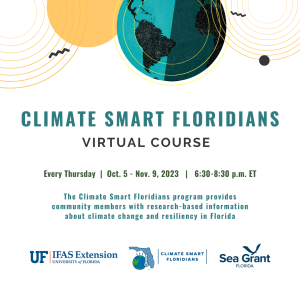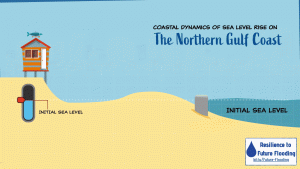 Several years ago, a group of Extension Agents and specialists created a series of classes called “Sustainable Floridians.” The course was designed to teach new and long-time residents about ways to conserve natural resources, energy, and water. Participants were encouraged to get involved in local community decision-making about environmental issues. The course had a module on climate and sea level rise, but participants were interested in digging a little deeper into the climate issues and how residents could do their part to respond to and understand the impacts of climate change to our state.
Several years ago, a group of Extension Agents and specialists created a series of classes called “Sustainable Floridians.” The course was designed to teach new and long-time residents about ways to conserve natural resources, energy, and water. Participants were encouraged to get involved in local community decision-making about environmental issues. The course had a module on climate and sea level rise, but participants were interested in digging a little deeper into the climate issues and how residents could do their part to respond to and understand the impacts of climate change to our state.
Based on that suggestion, the Climate Smart Floridians program was designed for expanded learning and discussion. The goal is to understand the science, learn respectfully from each other, and take action to reduce individual and community impacts. Topics include consumption and waste, water, food, transportation, Florida-friendly landscaping, green building, and energy use. Questions are encouraged, and we welcome any participant 18 or older. Prior understanding of climate-related concepts is not required.

This fall, a team of five Extension Agents from all around the state will co-teach the course. Starting Thursday, October 5, we will meet online via Zoom for 6 weeks, on consecutive Thursday evenings from 6:30-8:30 pm Eastern. We will have guest speakers join us to cover specific topics during several sessions. Depending on location, we hope to offer in-person field trips on a Saturday during the course.
To be part of our very first statewide Climate Smart Floridians course in Florida, you can register at this Eventbrite site. Cost for the class is $40. The instructors’ presentations will be recorded for later viewing, in case a timing conflict comes up or participants would like to review a concept. In between class sessions, we will stay in touch with class members and suggest articles and reading for discussion before the next meeting. If you have questions about the course, reach out to Holly Abeels at habeels@ufl.edu.
Source: UF/IFAS Pest Alert
Note: All images and contents are the property of UF/IFAS.



